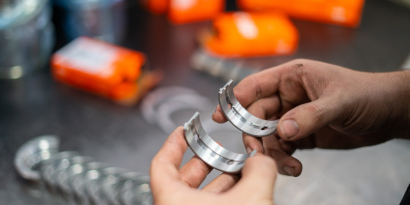Those who rely on a vehicle to fulfill daily tasks know that the cost of gasoline can weigh on the pocket. In this context, it is natural for drivers to seek alternatives to ease expenses. If you are one of them, and would like to know how to save fuel efficiently without harming your car, the good news is that RIO has prepared a special guide to help you with this task!
Want to do more with less? Learn how to save on fuel in 6 steps with RIO
Mixing gasoline with diesel to get better mileage? Coasting in neutral? Running on a near-empty tank? Forget about it! Besides potentially posing a risk to the driver, these actions can harm your vehicle’s engine and, in practice, have no significant effect. But fortunately, there are several effective strategies that can help optimize fuel consumption and safely reduce your refueling expenses — and we’ve gathered some of them here! Follow along:
1 – Keep up with vehicle maintenance
Want to know how to save fuel without doing anything out of the ordinary? Then keep in mind that, more than any other factor, maintaining the vehicle in good condition is essential to ensure efficient gasoline consumption. So, don’t skip the manufacturer’s recommended inspections, including oil changes, air and fuel filter replacements, spark plug replacements, and remember to check the electronic fuel injection system. Remember: the proper maintenance contributes to the smooth operation of the engine and, consequently, to fuel efficiency.
2 – Keep an eye on your tire pressure
Improperly inflated tires can increase fuel consumption, and surprisingly, there are many drivers out there who don’t pay attention to this. The golden tip here is to regularly check tire pressure according to the manufacturer’s recommendations, and to keep them properly inflated. It’s a matter of physics: tires with low pressure experience more friction with the road, making it harder for the axles to roll and making the car heavier. Consequently, the engine will require more gasoline — and guess who pays for that bill?
3 – Aim to drive at a constant speed
Did you know that driving aggressively, with sudden accelerations and abrupt braking, increases long-term fuel consumption? That’s because you’re subjecting the engine to intense and repeated efforts, requiring a higher compensation of air and fuel mixture in the combustion chambers. In this case, it’s ideal to maintain a constant speed and avoid unnecessary acceleration. If the option is available in your vehicle, it’s worth using the cruise control feature during trips, as it can assist in speed control and, consequently, fuel economy.
4 – How to save on fuel? Respect gear shifting
Properly shifting gears at the right moment can also make a big difference in fuel consumption — and not everyone knows this! We understand that for those who are still unfamiliar with fuel-saving techniques, this may seem like a small action to make a difference. However, believe it or not, when you calculate it over time in city traffic, this control can represent a significant difference at the end of the month, while ensuring better utilization of your engine’s power. Therefore, avoid revving the engine too much, and try to keep it within the appropriate RPM range for each gear.
5 – Avoid overloading the vehicle
Carrying unnecessary weight in the vehicle increases fuel consumption — a similar rationale to that of what was mentioned in our second topic on tire pressure. Don’t forget that the greater the weight, the greater the friction, and therefore greater effort required by the engine and pistons to set the car in motion. So, whenever possible, clean out the trunk and remove non-essential objects. Oh, and here’s a tip: the optimized weight limit of cars is calculated taking into account the weight of a full tank, so the idea that an empty or half-filled tank helps save on gasoline is a myth.
6 – Use the air conditioning wisely
Knowing how to save fuel wisely also requires conscientious use of the air conditioning in vehicles. After all, when the air conditioning is turned on, there is an additional load on the engine, resulting in increased gasoline consumption. Therefore, when driving at lower speeds and when the weather permits, opening the windows for ventilation can be a more economical option. However, at higher speeds where wind resistance is greater, it is more efficient to rely on the air conditioning and keeping the windows closed to reduce the resistance and, consequently, decreasing fuel consumption.
Now, just put in the effort and ensure safe and economical driving!
Monitoring fuel consumption is an important concern for many drivers, and we understand that it can lead to significant savings in the monthly budget. By following these simple tips, it becomes easier to balance the equation and reduce refueling expenses.
And remember, small changes in habits, and proper vehicle maintenance, can make a big difference in your long-term fuel consumption. Give these strategies a try and enjoy the benefits for both your wallet and the environment!
We hope that these recommendations are helpful to you. And if you need more information, or have other questions, you can rely on RIO, so feel free to ask below! Our team of experts is ready to answer them!





